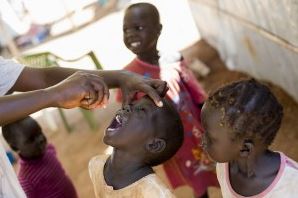The authorities of Abyei Special Administrative Area (ASAA) on Monday said a polio vaccination campaign launched over the weekend has so far reached 19,000 children in all four counties and the Abyei Municipal Council.
Officials told Radio Tamazuj that the campaign is targeting 22,000 children from age zero to 5 years and that they received the vaccines from the Expanded Programme on Immunization (EPI) of the national health ministry.
Poliomyelitis (polio) is a highly contagious viral disease caused by the poliovirus that primarily affects young children, leading to paralysis in about one in 200 cases, though most infections are asymptomatic or mild. It spreads mainly through the faecal-oral route, and while there is no cure, it is preventable through vaccination, which has dramatically reduced its incidence worldwide. Initial symptoms can include fever, fatigue, and neck or limb pain, with severe cases causing irreversible paralysis and sometimes death when breathing muscles are affected.
Kon Manyiet Matiok, the Abyei acting health minister who doubles as minister of physical infrastructure, said the campaign is supported by humanitarian organizations and that 19,000 children have already received the vaccine.
“We have many activities in Abyei by the Ministry of Health in coordination with our partners and a polio 0 vaccination) campaign is ongoing,” he explained. “Polio is a disease that affects children from age zero to 5 years, so we received 440 vaccination vials, which can vaccinate 22,000 children. So far, the Ministry of Health has managed to vaccinate 19,000 children.”
Minister Manyiet revealed that some far-flung hard to hard-to-reach areas will likely miss out on the exercise.
“The campaign covered Alal, Rumamer, Mijak, and Ameth-Aguok counties and Abyei Municipal Council,” he said. “However, the challenge is the eastern part of Abyei, which is not accessible. Places like Tac-Alei, Marial-Achak, Dungop, and Mabek are unfortunately going to have no vaccines due to poor roads, which have deteriorated due to heavy rains.”
Manyiet urged families from inaccessible areas to bring their children for vaccination.
Meanwhile, Bulabek Deng Kuol, the Paramount Chief of the Ngok Dinka of Abyei, encouraged people to take the polio vaccination seriously because it saves the lives of children.
“Parents do not understand that the polio vaccine is safe for children, and this thinking exists in every community due to primitivity, lack of education, and lack of civilization,” he said. “They should understand that prevention is better than cure. Any vaccination campaign needs awareness, especially at health centers where people are educated about what polio is and how it affects children, and what should be done when it affects a child.”
“This is a simple disease which could be combated in South Sudan, even Sudan is free of polio except for some suspected cases, and there is no way out unless we vaccinate our children under five years,” the paramount chief added.
For his part, Abyei Information Minister Yuohna Akol confirmed that the exercise commenced last Friday.
“The government and its partners launched the campaign, and all counties have vaccinators who are moving from house to house, and it will last for three weeks,” he said.




